Let me get the Impostor Syndrome part out of the way right up front. Last week I saw a call for submissions for a local art exhibition that would be PERFECT for my jewelry. I think — I believe — I want to believe — that my work would be a perfect fit for this particular art space and their vision. It’s a space I’ve been in love with for over 15 years. Shortly after I discovered it, my husband and I had our wedding there. I have taken a workshop with the artist - he is a local icon and learning his technique has informed and inspired my own designs. He is a mosaicist, and my jewelry incorporates found objects and bits and pieces and repurposed scraps into little micro-mosaics.
I learned tiling and mosaic work before I learned silversmithing, and there is something about fitting interesting individual components together to form a cohesive whole, that draws me in. I can lost for hours in the intricacies.
One might say my work is … more than the sum of its parts. More on that in a minute.



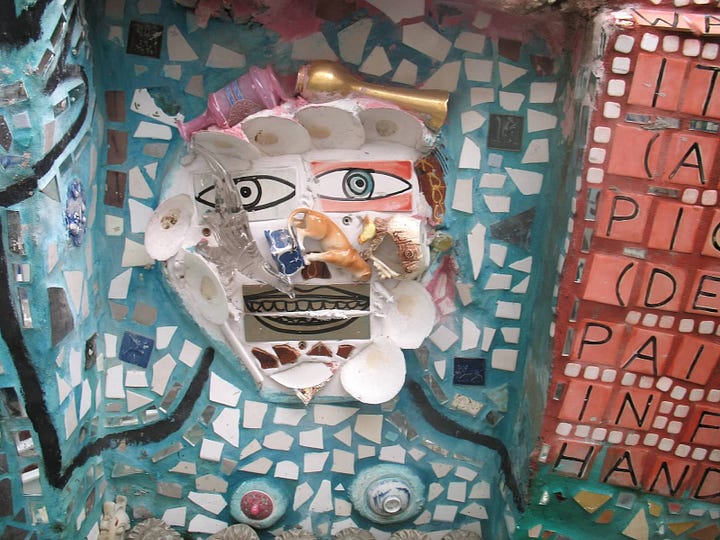
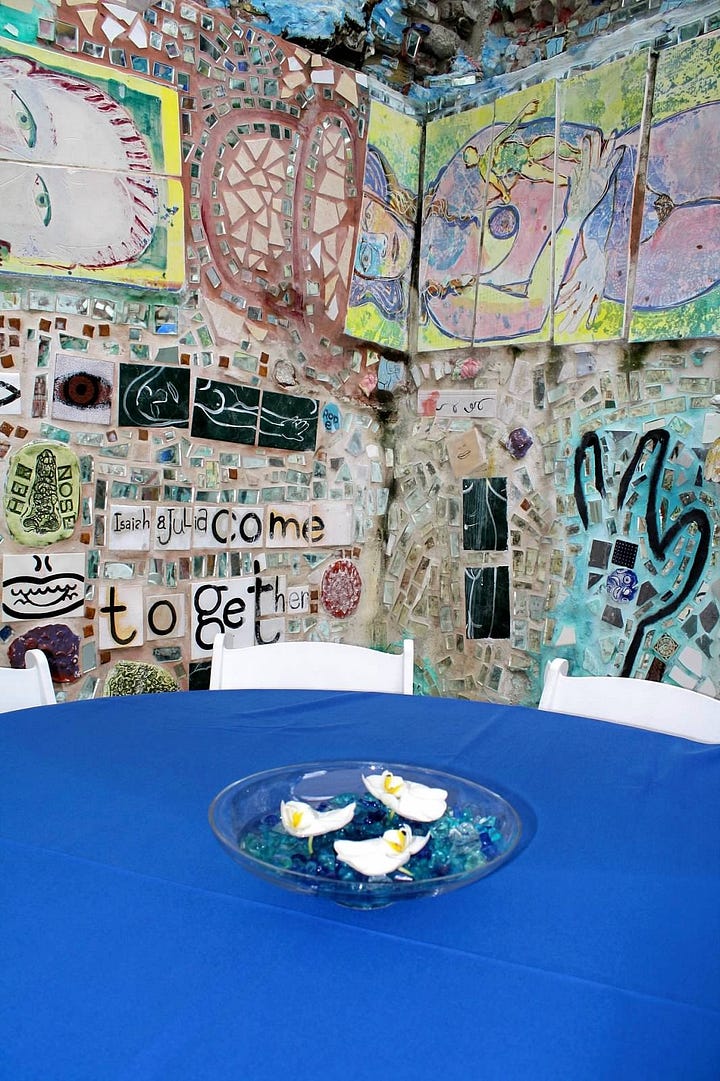
So, this awesome art space/gallery is having an exhibition that will feature local artists - of which I am one! All I have to do is submit the application! Bio, artist statement, photos of my work … no problem, right? The Artist Statement on my website is out of date and needs to be rewritten anyway; what a great opportunity! OK, then why have I been completely paralyzed like the proverbial deer in the headlights for almost a week? I get overwhelmed and walk away from my laptop every time I even think about it. (It took me 3 days to finish this paragraph!!)
Ah yes, there’s that monster, Impostor Syndrome, rearing its ugly head again, hissing in my ear, “you’re an amateur, a hobbyist.”
And, “your little trinkets are not good enough to be in a flea market, let alone an actual gallery exhibition.”
And, “craft jewelry is not real art.”
And, “you’re a psychologist, you didn’t go to art school, you can’t even call yourself an artist, how can you presume to show your work in public?”
Do you recognize this inner voice? We have all heard it. As a former psychotherapist/current human services professional, I am certainly aware of where it comes from. Let me tell you a story about that.
In my work and in my own therapy, I am learning about Internal Family Systems (IFS). It is what the name implies: we all have roles in our families of origin, and we also have different parts of ourselves (internal) that take on different roles depending on the situation. Some of those parts came into being when we were small children, to protect us or help us cope, and their strategies are maybe not so effective now. For example, my Inner Critic/Impostor Syndrome Monster Part who tells me I’m not good enough all day long, is protecting me from the inevitable rejection that I would experience if I put my heart and soul on display (you know, like by showing my art). So, in its own way, the Inner Critic is a Protector. This is a vast oversimplification. I’m fascinated with becoming aware of my parts, listening to their voices and their interactions. Hearing the child fears and the adolescent angst and rage. And then coming back to my Self and being aware of my wholeness, which contains multitudes.
Greater than the sum of my parts, indeed.
It’s all about the relationship of the parts to the whole. All of the parts are important; but their interconnectedness produces a rich, complex and meaningful picture when viewed all together from a different perspective. Individual pieces that were discarded and might otherwise be ignored, become integral to a new vision.
And now I’m back to describing my jewelry designs. I call them my “Scrappy” collection: little wearable mosaics.
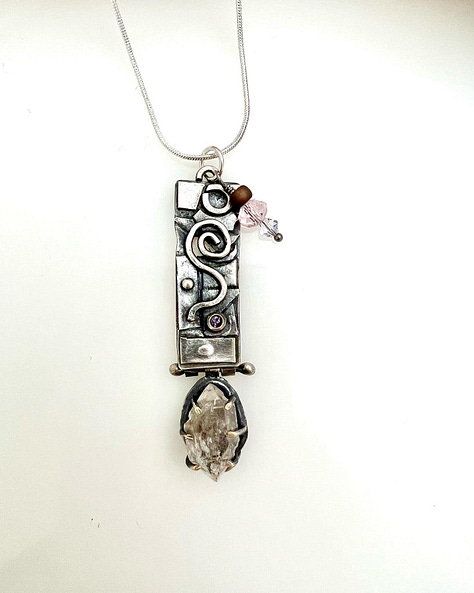
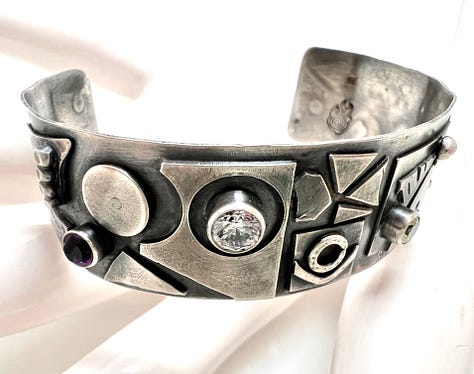
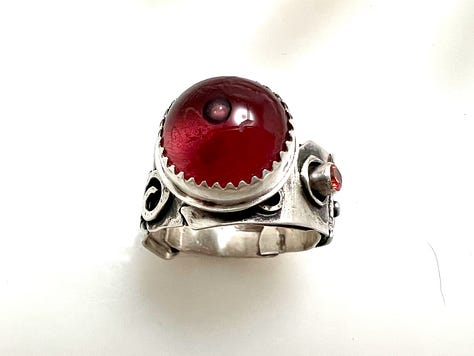
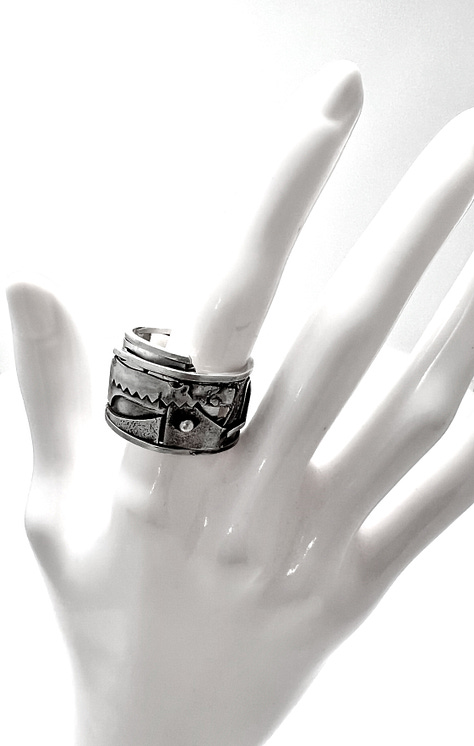
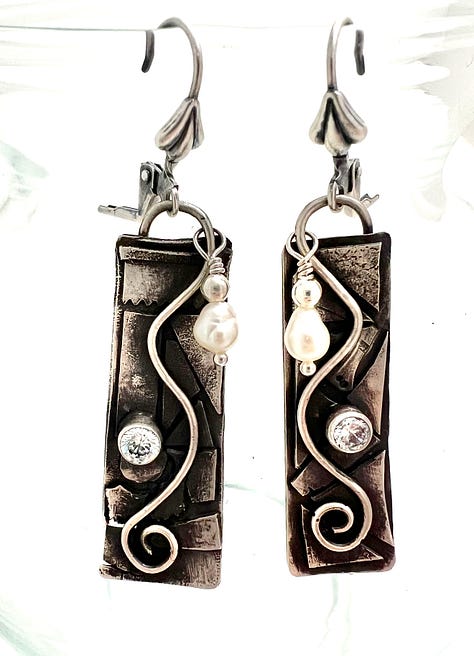
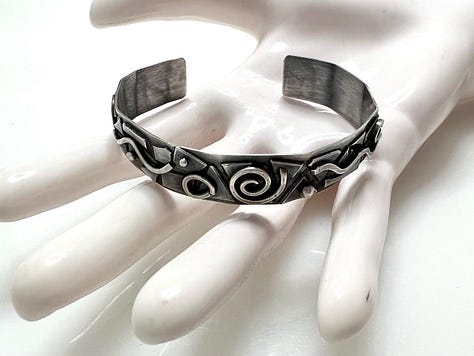
My art, in the making, is an opportunity to connect with my parts and my whole and healthy Self. Each piece is an expression of my experience: seeing beauty in the oddities; putting things together so they make sense; the joy of creation.
Can you see the connection? It feels very powerful to me. Now, I need to put these ideas into an ARTIST STATEMENT and that seems so big and intimidating. High-stakes. (My Inner Critic says I’m overreaching.)
So I have this crazy idea. If I’m going to face down that ugly monster Imposter Syndrome, maybe I need some support, encouragement, and suggestions from my community. If you can relate to this, I’d love to see your feedback in the comments, and maybe it will start a conversation. Feel free to send me links to other artists whose work or profiles you like. And over the next week or so I will share a draft or at least a paragraph or two of that big scary Artist Statement. Putting it out here is my first step.
Thank you for supporting me.
See you soon.


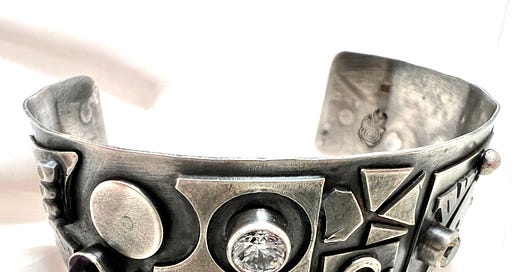


Dear Amy, Don't EVER think that you are NOT an artist! And, because you posted this essay five weeks ago, I hope that by now you have submitted your application (before the deadline!) and you were accepted!
BTW, apparently impostor syndrome only strikes people who are very accomplished--as you are!
You may be interested in this episode of Freakonomics/No Stupid Questions, which I heard on NPR recently. Here's a link to the audio as well as the transcript:
https://freakonomics.com/podcast/do-you-have-imposter-syndrome/
And here's a fairly recent article in the New Yorker about the same topic:
https://www.newyorker.com/magazine/2023/02/13/the-dubious-rise-of-impostor-syndrome
Personally, I don't have impostor syndrome. This may be because I only have one exemplary skill--editing--and I have enormous confidence in my abilities as an editor! (This is not to say that I don't make mistakes!) I'm also a pretty good writer and a better-than-average public speaker, as well as a diligent piano student, with an understanding of the fact that I will never be able to rise above a certain musical plateau because I don't have musical talent. In other words, I think I have an accurate understanding of my abilities, which precludes impostor syndrome.
Here's a story about that: A while ago, I lamented to my piano teacher that I wasn't a good sight reader, and I noted that Ray Charles and Stevie Wonder couldn't sight read at all but they both played the piano brilliantly. And my teacher immediately replied, "Yeah, but they had talent!" That cracked me up! (I could have replied, "Tell me something I don't know!")
When I told my teacher's adult daughter this story, she was aghast, and said that her mother's comment was "brutal"! But, because my teacher was right, it just struck me as funny!
My point is that only extremely accomplished people--like you!--seem to fall prey to impostor syndrome!
Love seeing all of these photos!
I feel really comfortable with doing an artist/author bio for myself (it's usually an author bio as I'm primarily a writer) but I get impostor syndrome in other ways.
It's been showing up at grad school lately, which is interesting. I think about saying something and I get a fear that the younger people are all smarter and more educated in the academic aspects of art than me and are going to challenge what I say and realize I don't know what I'm talking about. Which is ridiculous because I do know what I'm talking about or I say when I don't, and I'm in my forties and this is my second masters and I have published books I'm proud of. But it's a new context and it shows up. And thinking about IFS, it links to the part of me that felt this way when I went to high school so that's something worth healing / exploring.
I think it's helpful to keep a brag book of all of the things that make you feel good about your work. Photos of art you've created that you love, screenshots of text messages about your work that touched your heart, awards that were meaningful, whatever it might be.